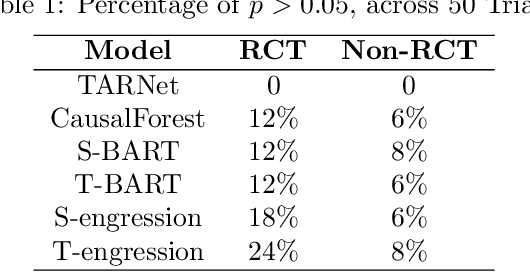Linying Yang
Testing Generalizability in Causal Inference
Nov 05, 2024



Abstract:Ensuring robust model performance across diverse real-world scenarios requires addressing both transportability across domains with covariate shifts and extrapolation beyond observed data ranges. However, there is no formal procedure for statistically evaluating generalizability in machine learning algorithms, particularly in causal inference. Existing methods often rely on arbitrary metrics like AUC or MSE and focus predominantly on toy datasets, providing limited insights into real-world applicability. To address this gap, we propose a systematic and quantitative framework for evaluating model generalizability under covariate distribution shifts, specifically within causal inference settings. Our approach leverages the frugal parameterization, allowing for flexible simulations from fully and semi-synthetic benchmarks, offering comprehensive evaluations for both mean and distributional regression methods. By basing simulations on real data, our method ensures more realistic evaluations, which is often missing in current work relying on simplified datasets. Furthermore, using simulations and statistical testing, our framework is robust and avoids over-reliance on conventional metrics. Grounded in real-world data, it provides realistic insights into model performance, bridging the gap between synthetic evaluations and practical applications.
A Critical Review of Causal Reasoning Benchmarks for Large Language Models
Jul 10, 2024


Abstract:Numerous benchmarks aim to evaluate the capabilities of Large Language Models (LLMs) for causal inference and reasoning. However, many of them can likely be solved through the retrieval of domain knowledge, questioning whether they achieve their purpose. In this review, we present a comprehensive overview of LLM benchmarks for causality. We highlight how recent benchmarks move towards a more thorough definition of causal reasoning by incorporating interventional or counterfactual reasoning. We derive a set of criteria that a useful benchmark or set of benchmarks should aim to satisfy. We hope this work will pave the way towards a general framework for the assessment of causal understanding in LLMs and the design of novel benchmarks.
 Add to Chrome
Add to Chrome Add to Firefox
Add to Firefox Add to Edge
Add to Edge